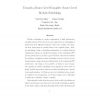Free Online Productivity Tools
i2Speak
i2Symbol
i2OCR
iTex2Img
iWeb2Print
iWeb2Shot
i2Type
iPdf2Split
iPdf2Merge
i2Bopomofo
i2Arabic
i2Style
i2Image
i2PDF
iLatex2Rtf
Sci2ools
124
click to vote
ICPPW
2006
IEEE
2006
IEEE
Towards a Source Level Compiler: Source Level Modulo Scheduling
Modulo scheduling is a major optimization of high performance compilers wherein The body of a loop is replaced by an overlapping of instructions from different iterations. Hence the compiler can schedule more instructions in parallel than in the original option. Modulo scheduling, being a scheduling optimization, is a typical backend optimization relying on detailed description of the underlying CPU and its instructions to produce a good schedule. This work considers the problem of applying modulo scheduling at source level as a loop transformation, using only general information of the underlying CPU architecture. By doing so it is possible: a) Create a more retargeble compiler as modulo scheduling is now applied at source level, b) Study possible interactions between modulo scheduling and common loop transformations. c) Obtain a source level optimizer whose output is readable to the programmer, yet its final output can be efficiently compiled by a relatively “simple” compiler....
Distributed And Parallel Computing | ICPPW 2006 | Level Modulo Scheduling | Modulo Scheduling | Source Level |
Related Content
| Added | 11 Jun 2010 |
| Updated | 11 Jun 2010 |
| Type | Conference |
| Year | 2006 |
| Where | ICPPW |
| Authors | Yosi Ben-Asher, Danny Meisler |
Comments (0)

